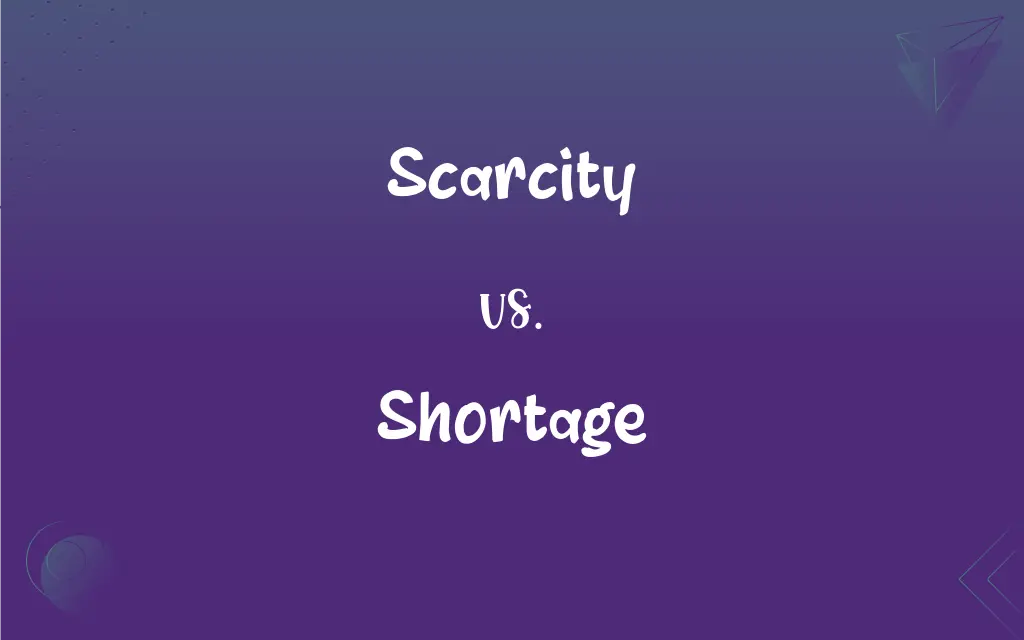Scarcity vs. Shortage: What's the Difference?
Edited by Aimie Carlson || By Harlon Moss || Updated on October 12, 2023
Scarcity refers to the fundamental economic problem of having seemingly unlimited human wants in a world of limited resources. Shortage is a situation in which something is not enough to meet the demand.

Key Differences
Scarcity often denotes a fundamental and extended lack, while a shortage implies a temporary and immediate deficit. Scarcity points towards an overarching, continual lack of resources to meet the infinite demands, whereas a shortage is a situational and often unexpected deficit in the available resources.
Scarcity is ingrained in the nature of economic resources, while shortage is more circumstantial. The notion of scarcity permeates all economic theories, acknowledging the perpetual tension between finite resources and infinite wants. In contrast, a shortage is typically triggered by disruptions, such as logistical issues or sudden spikes in demand, which are often temporal and resolvable.
Scarcity extends to various elements like time, money, and physical resources, whereas a shortage is usually constrained to a specific item or resource. While scarcity can be seen in the broader context, affecting myriad facets of life and economics, a shortage tends to be confined to particular sectors, items, or timeframes.
Scarcity demands calculated allocation and prioritization, whereas shortage requires immediate, often logistical, solutions. Addressing scarcity involves a strategic allocation and prioritization of resources, whereas tackling a shortage might entail addressing supply chain hiccups or enhancing production temporarily.
Both scarcity and shortage impact prices but usually in distinct manners and durations. Scarcity can influence the baseline price and value of resources over extended periods, while a shortage can cause abrupt, and potentially temporary, price hikes due to sudden supply-demand imbalances.
ADVERTISEMENT
Comparison Chart
Duration
Persistent and inherent
Generally temporary
Implications
Broad, affecting various facets of economics
Specific to a particular resource or condition
Causation
Fundamental economic principle of limited resources
Could be due to various factors like logistics
Resolution
Requires systematic planning and allocation
Can be addressed by resolving specific issues
Influence on Price
Steady and might determine base price
Sudden, often sharp fluctuations
ADVERTISEMENT
Scarcity and Shortage Definitions
Scarcity
Scarcity is a perpetual condition, signaling a continual struggle between finite resources and potentially infinite demand.
Energy scarcity makes it vital to explore sustainable and alternative energy sources.
Shortage
Shortage refers to the situation when demand exceeds supply within a certain timeframe.
A sudden cold wave created a shortage of heating fuels in the market.
Scarcity
Scarcity implies a continual deficit in resources needed to satisfy the wants of a population.
The scarcity of skilled labor in the tech industry drives up salaries for qualified individuals.
Shortage
A shortage often implies a situation where the existing supply fails to meet the immediate demand.
The concert experienced a food shortage due to the unexpectedly high turnout of attendees.
Scarcity
Scarcity refers to the fundamental economic issue of limited resources relative to unlimited wants.
The scarcity of water in arid regions necessitates meticulous planning and use.
Shortage
A shortage usually pertains to a specific commodity, service, or resource, and is often resolvable.
The production hiccup caused a temporary shortage of smartphones in the market.
Scarcity
Scarcity underscores the necessity to prioritize and allocate resources wisely to adequately meet various needs and wants.
Economic models need to factor in resource scarcity to devise effective strategies.
Shortage
A shortage is a temporary insufficiency of a good or service.
The unexpected strike caused a significant shortage of public transport services.
Scarcity
Scarcity often dictates the intrinsic value of a resource, based on its availability and demand.
Diamond’s high value is partly attributed to its scarcity in accessible locations.
Shortage
Shortage denotes a deficit or inadequacy in quantity, often requiring urgent action.
The shortage of medical supplies during the pandemic posed critical challenges.
Scarcity
Insufficiency of amount or supply; shortage
A scarcity of food that was caused by drought.
Shortage
A deficiency in amount; an insufficiency.
Scarcity
Rarity of appearance or occurrence
Antiques that are valued for their scarcity.
Shortage
A lack or deficiency; an insufficient amount.
Scarcity
(uncountable) The condition of something being scarce or deficient.
Shortage
Amount or extent of deficiency, as determined by some requirement or standard; as, a shortage in money accounts.
Scarcity
(countable) An inadequate amount of something; a shortage.
A scarcity of grain
Shortage
The property of being an amount by which something is less than expected or required
Scarcity
A small and inadequate amount
Shortage
An acute insufficiency
FAQs
What primarily causes a shortage?
Shortages can be caused by various factors like disruptions in supply chains, unexpected spikes in demand, or natural disasters.
Is a shortage always temporary?
While shortages are typically temporary, their duration can vary and might sometimes extend longer than anticipated.
Can scarcity be resolved?
Scarcity, being a basic economic concept, cannot be completely resolved due to the perpetual nature of limited resources and unlimited wants.
What fundamentally defines scarcity?
Scarcity fundamentally signifies the persistent lack of resources to meet infinite demands.
How does scarcity impact economic planning?
Scarcity necessitates strategic planning and prioritization in the allocation of resources to various sectors and demands.
How is a shortage different from scarcity in affecting prices?
Shortages can cause abrupt, potentially temporary, price hikes, while scarcity may influence the baseline pricing over a longer term.
What are the common responses to a shortage?
Responses to a shortage may include increasing prices, rationing, or sourcing alternative supplies.
How can technology impact scarcity?
Technology can impact scarcity by introducing alternatives or improving production efficiency, potentially alleviating some aspects of resource scarcity.
Can something be scarce but not in shortage?
Yes, something can be scarce but not necessarily in shortage if the demand is adequately met by the available supply.
Are shortages and scarcity both economic concepts?
Yes, both shortages and scarcity are concepts used in economics, but they also apply to general discussions about availability and demand of resources.
Can scarcity affect quality of life?
Yes, scarcity can impact the quality of life, especially when it pertains to essential resources like water, food, or shelter.
How does scarcity influence consumer behavior?
Scarcity can drive urgency in consumer behavior, potentially making them prioritize purchases or explore alternative options.
Does scarcity always lead to high value?
Not always, but scarcity can contribute to higher value if the scarce item is also in high demand.
Can the global market influence local shortages?
Yes, global market dynamics, such as international demand or trade policies, can influence local shortages.
What role does government play in managing shortages?
Governments may manage shortages through regulations, strategic reserves, price controls, or facilitating alternative supply sources.
Can scarcity be artificially created?
Yes, artificial scarcity can be created, for example, through monopolistic practices or intentional reduction of production.
Is scarcity always a bad thing?
Not necessarily. Scarcity can drive innovation and efficient resource use but can pose challenges if essential resources are scarce.
How can businesses navigate through shortages?
Businesses might navigate through shortages by diversifying suppliers, maintaining a stockpile, or finding alternative resources.
Does scarcity always imply high cost?
Not always, but scarcity can lead to higher costs if the scarce resource is essential and in high demand.
Can a shortage lead to price inflation?
Yes, shortages often lead to price inflation due to the immediate imbalance of supply and demand.
About Author
Written by
Harlon MossHarlon is a seasoned quality moderator and accomplished content writer for Difference Wiki. An alumnus of the prestigious University of California, he earned his degree in Computer Science. Leveraging his academic background, Harlon brings a meticulous and informed perspective to his work, ensuring content accuracy and excellence.
Edited by
Aimie CarlsonAimie Carlson, holding a master's degree in English literature, is a fervent English language enthusiast. She lends her writing talents to Difference Wiki, a prominent website that specializes in comparisons, offering readers insightful analyses that both captivate and inform.































































